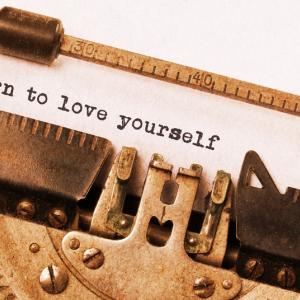
Today, I am the Managing Director of Freedom a la Cart, a social enterprise that offers employment, workforce development, and supportive services to local, adult survivors of human trafficking. The women that I work with are victims of unimaginable trauma and abuse. They are also the strongest, most resilient women I know. Through their words and actions they continue to teach me the power of loving oneself.
Because here is my deepest, darkest secret—the one that I never speak about. The one that I shove deep down and hope that no one ever learns about.
I struggle to love myself.
I am the boss, the director, a caretaker, an advocate for social justice. But I don’t love myself, and I struggle with self-worth daily. I am a perfectionist and constantly feel that I am “not enough.”
It wasn’t until my 30th year of life that I realized how broken and human I was. Jesus tells us to love our neighbor as we love ourselves. I was doing a terrible job of loving myself and realized I could not truly love these survivors until I loved myself.
All too often, advocates and activists present themselves as superheroes, rescuing the poor and defenseless. We hide our fear, our guilt, our shame, our self-loathing, because we are supposed to be the strong ones. We are supposed to have all the answers. And yet what is demanded of us isn’t perfection, but rather our faithfulness and willingness to be vulnerable.
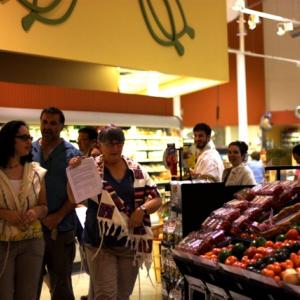
Closer to home, one of the messages that many of us often hear is that there is slavery in the supply chains of the products that we buy every day: cotton, chocolate, produce. This can be paralyzing when we go to the mall or the grocery store. None of us want to purchase something that originates in an extreme human rights violation. But the solution cannot be simply to buy a different product. When we talk about labor trafficking, we must keep the focus on the worker who is enslaved rather than the product we consume.
As a rabbi, I know that is not my tomato or banana that is created in the image of God—it is the person who picked that product. Fighting for food justice means ensuring the human rights and wages of workers, and doing so in a way that places the needs, dignity, and expertise of the workers at the head of the table. This last piece is crucial: no one can tell us how best to solve human rights abuses in supply chains, including modern slavery, more than the workers who have the most at stake...
We must raise up the leadership of those most affected by forced labor and support their efforts to create new futures for themselves. Since 2011, T’ruah has taken more than 50 rabbis to Immokalee to learn from the CIW. The stories they hear—and the transformation they see—inspire them to go home and turn their congregations into more than just educated consumers. They become activists: they write letters to corporations urging them to join the Fair Food Program, stage protests, take Hebrew school students to meet with managers, write op-eds, and deliver sermons. Our #TomatoRabbis have become part of the larger movement of Fair Food activists, urging corporations to live up to their professed values and join the new day dawning in the Florida tomato industry that is the only proven slavery-prevention program in the U.S.

Augustine’s principle of avoiding revictimization and providing care can be applied to those who are sexually exploited. As my colleague Lani Prunés points out, the federal government and most states have Safe Harbor Laws which treat trafficked minors as victims rather than criminals.
These victims didn’t violate their own chastity and, therfore, are not guilty. But an unfortunate number of states don’t provide trafficking victims immunity from prosecution or adequately fund reintegration services. In so doing, we continue to maintain the shame-based morality of Greco-Roman culture in which the victim of exploitation is responsible for the sin and crime of human trafficking.
Legal protections are essential to aid reintegration, but moral protections are also necessary to support trafficking survivors. By funding recovery programs, we can learn from Augustine the value of not blaming the victim. Victims should be given the help they need to reintegrate into society (as organizations such as FAIR girls, Courtney’s House, or End Trafficking are doing), rather than leaving them vulnerable to returning to a dangerous and degrading form of life.
If we allow people to be shamed or forced into crime through a lack of viable alternatives, we are morally culpable like the Greco-Roman society which taught women that their life was only worth as much as their physical purity.

While some people may have heard of the great work of Nuns on the Bus to engage people on pressing social issues, there’s also the “Nuns on the Underground Railroad”—a quiet movement of nuns working together to restore dignity and healing for victims of labor and sex trafficking across the nation and the world...
For several years now, Catholic nuns have been proactive in preventing sex trafficking before, during, and after major sporting events like the Super Bowl by raising public awareness and conducting personal visits to hotels to alert them to the signs of human trafficking. Nuns have also placed full-page ads in airline magazines to educate the public about the dangers of child trafficking.
A fundamental theological and scriptural principle for Christians is that each human person is made in the image and likeness of God. This belief in the imago Dei helps us to see the face of God even when the person doubts her own beauty and worth because of oppression. “Nuns on the Underground Railroad” seeks to restore a person’s sense of dignity and beauty through two rails of freedom: healing through programs and shelters and empowerment through education and employment.
As we move toward the Lenten season, the prophet Isaiah reminds us: "Is not this the fast that I choose: to loose the bonds of injustice, to undo the thongs of the yoke, to let the oppressed go free, and to break every yoke?" (Isaiah 58:6)
How is God moving your heart as you awaken to the stories of human trafficking victims? What action can you take for your enslaved sister and brother? What will you bring to your faith community to stir up concern? One single action to educate others and liberate the oppressed strengthens freedom throughout the world. As our mission affirms, “Ending slavery is everyone’s work.”

If you’re reading this, you probably already know that modern-day slavery is a thriving, lucrative, global business. There are more slaves alive today than during the entire 400 years of the trans-Atlantic slave trade. Human trafficking generates about $150 billion in profits every year. And 1 in 3 trafficking victims are children.
The statistics are staggering.
For me, it was a single story that moved me through the numbers to a place where I could take action. I heard about Charina* when I joined International Justice Mission. She was one of the first girls we helped rescue in Cebu, Philippines.
Charina was 13 when she was sold for sex.
Her family was very poor, and she had dropped out of school in fourth grade. Her mother was the first one who sold her. For the next couple years, pimps took turns selling her from street corners and seedy piers. They earned extra because she looked so young.
Charina was finally freed from this harsh cycle of violence in 2007. She was addicted to drugs, pregnant and unable to trust the people who wanted to help her. The work of freedom was just beginning.
My colleagues started meeting regularly with Charina. She needed professional care and a customized plan to meet her unique and complex needs. She needed trauma-focused counseling. She needed to learn how to trust others and to believe in herself once again.
When I first heard her story and saw a photo of Charina—her bright eyes, her small frame—my first reaction was anger. This young woman should never have suffered in the many ways she has.
And that anger is right. It’s not fair.
Charina’s story has illuminated another reality for me, a more hopeful one. It doesn’t have to be this way.

In a few days, Americans will gather across the country to watch the Super Bowl.
But what many of them don’t know is what happens outside of the stadium—a seedy underworld that profits off the sale of American children.
Every year, approximately 100,000 children are forced into prostitution in the United States—and many are illegally “bused in” to locations hosting major sporting events like the Super Bowl. Once the game is over, victims are relocated to the next profitable event.
The trafficking of our kids is not a game.
I can tell you firsthand that homeless children—desperate for food, shelter, and comfort—are the biggest victims of this horrific industry. At Covenant House, we’ve seen too many of these innocent children come through our doors.
I can also tell you that no homeless kid sells his or her body by choice. In a survey we conducted with Fordham University, almost 25 percent of homeless kids were either victims of trafficking or felt they needed to trade sex in order to survive.
ALL of them greatly regretted having to trade their bodies—a trauma that can haunt them for the rest of their lives.
We are doing everything we can to help these victims, as well as ensure that homeless kids who are at risk of becoming victims never fall prey to this vile industry.
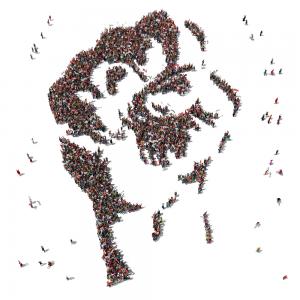
When stories of human trafficking or dramatic rescue operations come across our news feeds, we are understandably shocked. For a moment, our attention is grabbed and we feel genuine outrage toward the traffickers and, hopefully, compassion for the trafficked persons. But to what end?
Sadly, the underground and criminal nature of human trafficking helps to keep the stark realities out of sight and, consequently, out of the minds of most people. When we do think of human trafficking, it tends to be as something that happens “over there” or in seedy brothels. It is somehow easier to blame the bad actors, pimps, traffickers, and sweatshop managers rather than recognize the multiple ways that we are connected to human trafficking through our everyday actions. Because we are, in fact, connected. As Pope Francis observed in his apostolic exhortation, Evangelii Gaudium: “There is greater complicity than we think. The issue [modern slavery] involves everyone!”
Human trafficking is present in virtually every human community. Moreover, because the majority of people held in slavery today are forced to work in agriculture and mining, it is inevitable that products make it into the supply chain and our shopping carts. Sex trafficking also does not happen in a vacuum, but rather in a social context which tolerates, and even normalizes, sexual exploiation and the commodification of the human person.

When a San Antonio couple was caught trafficking a 16-year-old online, their excuse was that they had no prior knowledge of her age and “were trying to help her.” Meanwhile, Jeffrey Charwick Wright, a now ex- Navy sailor, trafficked an HIV-positive 17-year old in Virginia, Maryland, and North Carolina for his own good. But hey, at least he could admit it.
These horrible anecdotes are popping up all over the U.S., with underage children—both Americans and immigrants—trafficked for labor, and more often, for sexual exploitation. The most surprising issue, however, is the conversation on whether those who are trafficked are criminals themselves. Sadly, in 19 states and all of the American territories, that is the case.
The good news is that a majority of states have some form of "safe harbor laws," laws that prevent underage victims of trafficking from facing criminal charges and from being treated as culpable and willing participants.
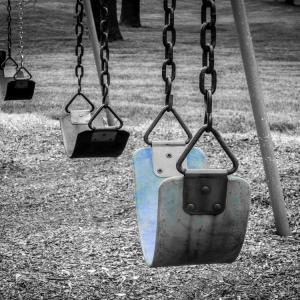
Everyone who desires to follow Jesus’ command to love can pour that love into their own communities, where thousands of children languish in foster care, are legally tangled in the juvenile system, and are raising themselves with no strong adults to guide them forward.
These children in our communities are vulnerable to human trafficking unless each of us does something about it. Right here at home.
In Matthew 5, Jesus tells us to love our enemies. We should love even the unlovable, especially the downtrodden, the forgotten. Don’t be afraid to love those that the world says aren’t worth it, the throwaways, the ones we too often pretend don’t exist.
Love big, love strong, love deep with compassion and bravery. Love those who spit in your face and curse you, the ones who break your heart over and over again. Your love may be the catalyst that keeps that one person from becoming a statistic.
Who will end slavery? You will. How will we end slavery? By God’s grace, through love and fortitude. Not in a faraway place but right here, at home.

I am co-owner of an online boutique store that empowers survivors of trafficking with employment.
I am a social entrepreneur.
I am an abolitionist.
I am…uncomfortable with these kinds of labels.
Because at the end of the day, I’m very ordinary, and these descriptors seem to imply that I’m not.
I live an ordinary life. I wake at the crack of dawn to drive my kids to school and then return home to work, trying to get most of my business done during the hours that my children are at school. Snow days and random holidays are the bane of my work life, and the words, “Sorry, hon, I’m working right now. Give me a minute?” come out of my mouth more than I’d like. I spend the lion’s share of my days on my laptop, troubleshooting, responding to emails, thinking about future lines of clothing, and making sure that the expenses won’t be more than that month’s income. Sometimes, in the midst of the daily humdrum of life, I forget that what I’m doing really does make a difference, half a world away, in the lives of survivors of trafficking.

Human trafficking is an overwhelming and complicated issue.
(Actually the root causes of human trafficking are complex. But there’s nothing complicated about treating people like people, not property).
Yet, how can those with little time to volunteer or a burgeoning desire to make some kind of difference do so?
Support socially responsible businesses! Here are five groups dedicated to helping sell the products of at-risk women and girls, as well as trafficking survivors—supplying them with work and the means to provide for their families.
Engage in smarter buying—invest in women, in their work, and in their futures.

Mint's life has been changed since working at NightLight. Having an economic alternative is an essential part of bringing liberation to women who have been trafficked or prostituted. The exit or rescue is only the beginning of freedom. At the same time, a job alone does not restore a woman to her true identity and humanity. There is a well of pain and trauma that lies beneath the surface.
Most organizations that provide after care for survivors struggle to support the financial burden of restoration. When the rescue is over, the support often dwindles before the woman is fully restored and ready to thrive on her own. Without intentional and holistic after care, victims who are rescued often find themselves vulnerable again. Left alone, the familiarity of their slavery can begin to look like the best option for survival.
A successful business can provide the wages and benefits needed to sustain a woman while giving her the opportunity to reach full restoration. When the greater community invests in freedom products, we can help vulnerable women reach their full potential.
For Mint’s sake and other women and girls, may it be so.
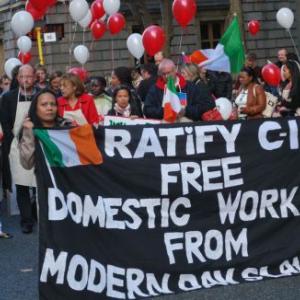
North America is home to an estimated 1.5 million trafficked persons alone. Many of these people are domestic workers—an industry with a growing worth of $8 billion in profits every year.
Many domestic workers in the United States are hard working people who enjoy their jobs and have fair working conditions. But the private and unregulated nature of the job does make these workers vulnerable to exploitation and sometimes a destination job for trafficked women.
This is the problem that authorities grapple with: how to regulate a global industry where workers are so open to exploitation and abuse.
Enter Convention 189—a document that creates international law preventing the trafficking and exploitation of domestic workers like Erwiana. This new international law deals with much of the complexity of the problem while still allowing domestic workers to earn a fair living and bargain for their conditions.
National governments have begun to sign on to Convention 189, but the U.S. and other larger countries are lagging behind in its support for tougher global protections for domestic workers.
For many, these new global protections can’t come fast enough. We know that the more countries like the U.S. sign onto Convention 189, the more robust the law will be and the better the protection for domestic workers.
Occasionally our governments need reminding that the plight of some of the most vulnerable must become a priority. Join me in calling on the United States to support global protections for domestic workers by ratifying Convention 189.

Human slavery has been in existence for thousands of years and unfortunately still flourishes today. An estimated 36 million slaves exist — perhaps more than any time in history —in countries around the world, even the U.S.
“You shall not pervert the justice due to the sojourner or to the fatherless, or take a widow’s garment in pledge.” —Deuteronomy 24:17
This verse names the three populations most vulnerable to exploitation: those living in a foreign country, children without parents, and women without protection. These populations have always been the most vulnerable to human trafficking, and they remain so today.
Hope for Justice aims to end human trafficking in our lifetime. And one priority to achieve that in the U.S. is training healthcare professionals to recognize victims of human trafficking. Almost 88 percent of victims of domestic sex trafficking encounter healthcare professionals while they are being trafficked.

Florida is a target state for traffickers, with the Tampa Bay area as a top destination for this monstrous activity. Tampa Bay has a lethal combination of tourism, world famous beaches, hospitality and agricultural industries, sports arenas, a military base, international seaports and airports, as well as a destination spot for one of thelargest adult entertainment industries in the nation. This combination attracts all forms of human trafficking which has become a larger money maker than selling drugs, as the human "product" can be used and re-used over and over again.
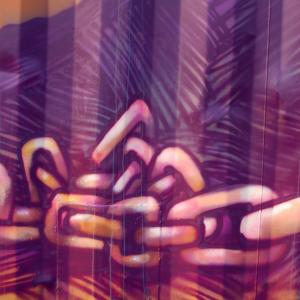
January is National Human Trafficking Awareness Month, but my wish is that we all work to make a real difference every month and every day of the year. I am a survivor of child sex trafficking. But there are other forms of modern-day slavery, like labor trafficking, that are just as evil. Human trafficking affects vulnerable women, men, children, and adults in both developed and emerging countries. Whether it is a 12-year-old runaway — like I was — or a 35-year-old man looking for a better job, vulnerable people are exploited and coerced every day.
Children who have been trafficked — as I was — often do not recognize themselves as victims. It took me decades to begin to see myself as a victim. The manipulation, exploitation, and fear put in place by my trafficker set about normalizing my trauma and also convinced me that it was all my fault.
My greatest hope and purpose in life today is to reach others in as many ways as I can so that they may never have to experience what I did for so long. We must ask important questions in order to really begin to make a difference. Here are a few of the most important questions to be asking.